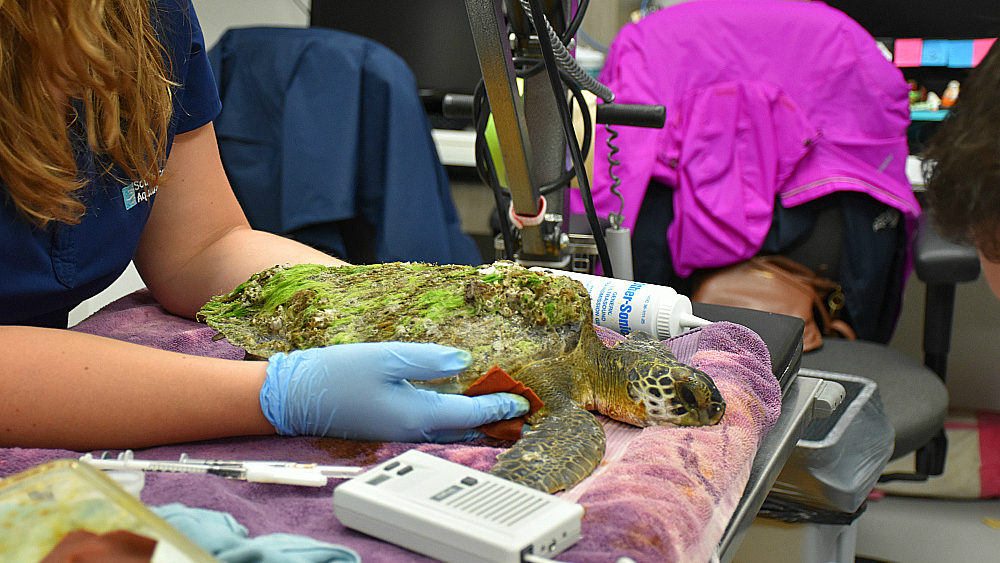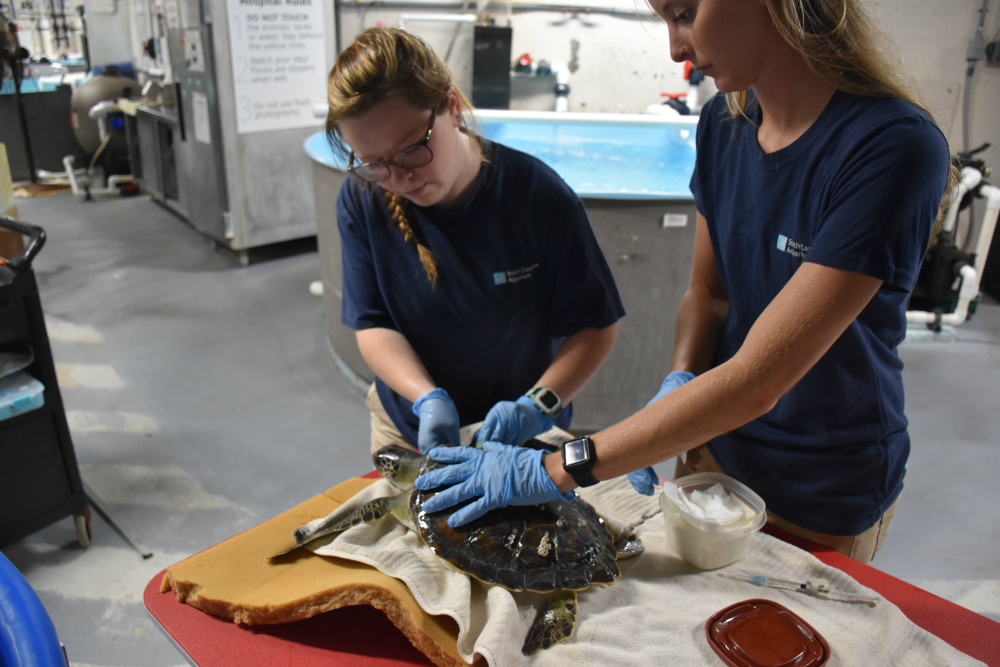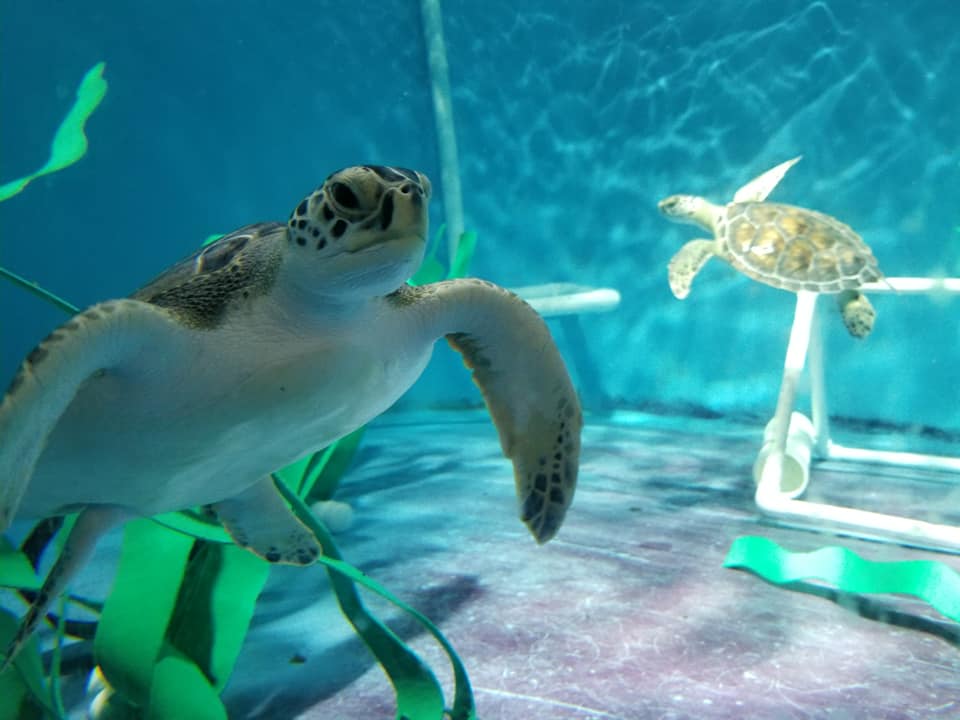Green Sea Turtle (Chelonia mydas)
Stranding Location: North Myrtle Beach, SC
Arrival Date: 05/20/2018
Age: Juvenile
Weight: 2.65 kg (5.8 pounds)
Case History
This juvenile green sea turtle was found bright and early at the high tide line at 39th Avenue in North Myrtle Beach (NMB) by NMB Sea Turtle Patrol volunteer, Bill Crummett. For the past five summers, Bill has walked the beach looking for loggerhead nesting activity from the night before. However, that morning he found more than just sea turtle tracks! Linda Mataya, a South Carolina Department of Natural Resources (SCDNR) volunteer and NMB turtle patrol member, quickly responded to Bill’s call about a stranded turtle. Linda transferred Fred to her car and drove him over two hours to the South Carolina Aquarium where Sea Turtle Care Center (STCC) staff and interns were ready to begin the triaging process.
Treatment
Once in the Care Center, Fred was given a thorough physical exam. Given his heavy epibota load of barnacles and algae, it was clear that he must have been floating lethargic for some time before finally washing up on shore. After running Fred’s blood, the vet team saw that Fred’s blood sugar was low, and he was dehydrated. The vet team treated Fred with vitamins, antibiotics and fluids. Since Fred was hypoglycemic and dehydrated, he received 2 different types of fluid, 5% Dextrose and Normosol-R. The Dextrose was administered under the skin. With both of these fluids on board to help replenish electrolytes and sugar, Fred began to feel a lot better!
Updates
May 21, 2018: Fred Weasley was placed in a tank with around 12 inches of freshwater after his triage. The freshwater will help remove some of the epibiota, or hitchhikers, on Fred’s shell, and as a bonus will also aid in rehydration. Once placed in the tank Fred immediately began to swim around and was resting on the bottom! This is a great sign as juvenile greens commonly present with buoyancy disorders and are unable to dive.
May 22, 2018 Today, the salinity of Fred’s tank was increased to 3 ppt water. (Ocean water is around 30 ppt.) Over the next couple days, the salinity of his tank water will be slowly increased. This slow increase in salinity will help Fred’s body adjust to the change without shocking his system and further assist in the removal of some of that algae. He was offered food today, and he immediately started to eat! Fred’s loving his temporary home!
June 1, 2018: Fred is doing great! He has started eating off the bottom and foraging around his tank for all the fish! His favorite is dandelion greens – he eats them like spaghetti! Fred is still getting antibiotics and has a long road to recovery ahead of him. We’re so proud of how far he’s come!
June 15, 2018: Fred will be finishing up on his antibiotics very soon! A lot of his barnacles have fallen off, which have left a couple areas of exposed bone on his shell. Staff treats these wounds with betadine and silver collasate. Silver collasate is a sliver-based topical ointment. Using both betadine and silver collasate will keep the areas nice and clean and promote healing. Fred loves to stay active in his tank and enjoys spending time in his seagrass enrichment.
July 1, 2018: Fred is doing great! His shell has healed over very well in the areas that were damaged due to barnacles. Fred will be here for a little while longer to gain weight and stabilize his blood values.
July 15, 2018: Fred has moved up to Zucker Family Sea Turtle Recovery! He’s loving his new tank and loves to be the center of attention. Fred enjoys to make staff, volunteers and interns lives a little difficult by constantly splashing all over the floor. Make sure to come see him!
August 1, 2018: Fred is doing great! He stays very active and loves eating his veggies. He’s quickly become a favorite by guests and staff here at the South Carolina Aquarium.
August 15, 2018: Fred is continuing to do great! He’s going to be tagged for release tomorrow. Tagging is our patients’ first step toward heading home. Fred isn’t leaving quite yet, but he is packing his bags and getting ready to go back home! Come see Fred before he returns to the big ol’blue.
September 1, 2018: Fred was tagged for release! He received a small PIT tag which was placed in his shoulder muscle. A PIT tag is a microchip tag, similar to what cats and dogs get. This tag doesn’t allow us to track Fred, but if he is found after we release him, then the microchip number can be used to identify him. During the tagging process we take blood and do an overall physical exam. The blood gets sent off, and it usually takes us around 2 weeks to get the results back. If he passes all of his tests, he should be going home very soon!
October 1, 2018: Fred rode out Hurricane Florence with fellow green sea turtle Nagini in our largest tank! Both turtles did surprisingly well sharing a tank! Fred was pulled for tagging last month but did not quite make the cut with his blood work results. We have increased his diet and are pulling him for a blood recheck later on this month. Fred continues to cruise around in style in our most spacious tank.
October 15, 2018: Fred had his blood recheck recently and got the all clear! His weight and blood work look great so he is now ready to go home. Yay, Fred!
Release Date
October 17, 2018
Release Location
Offshore





